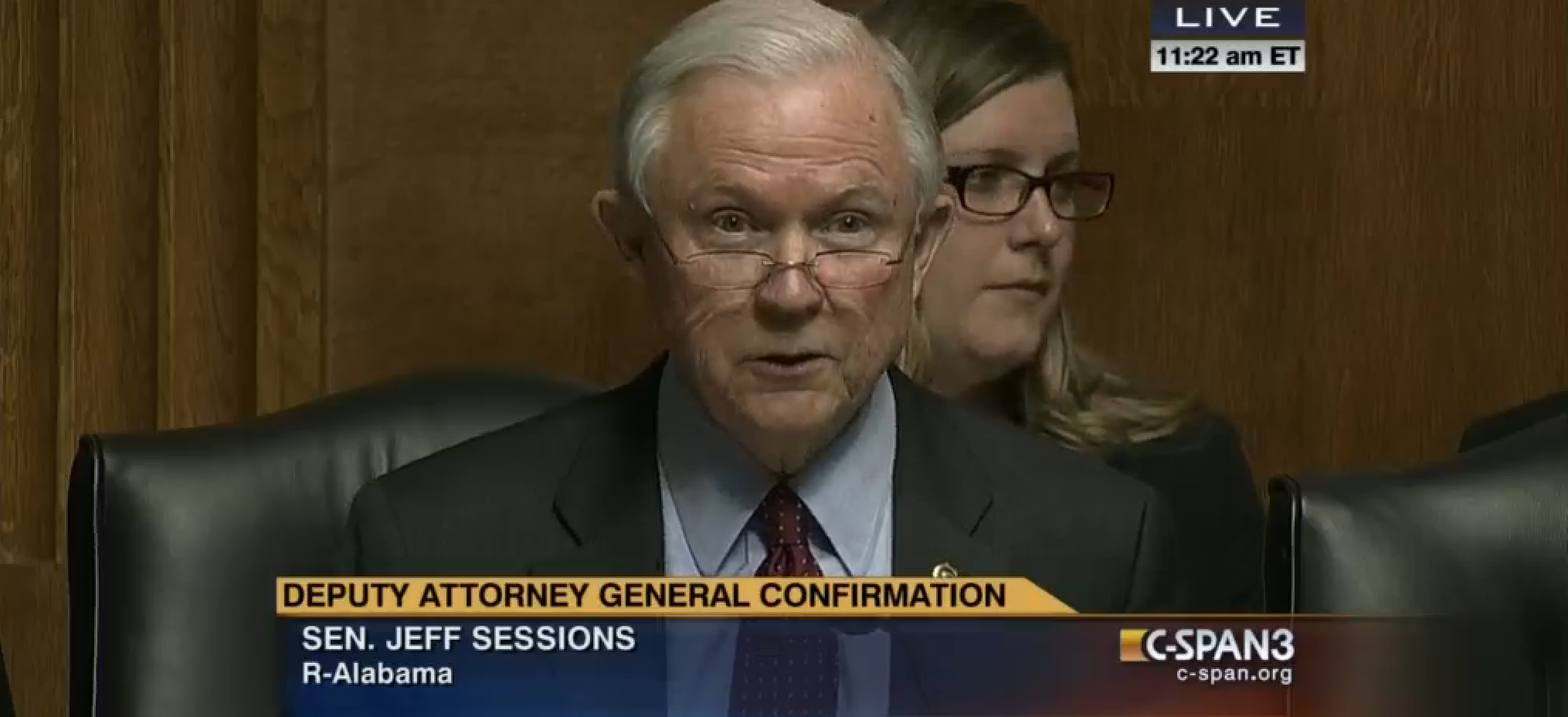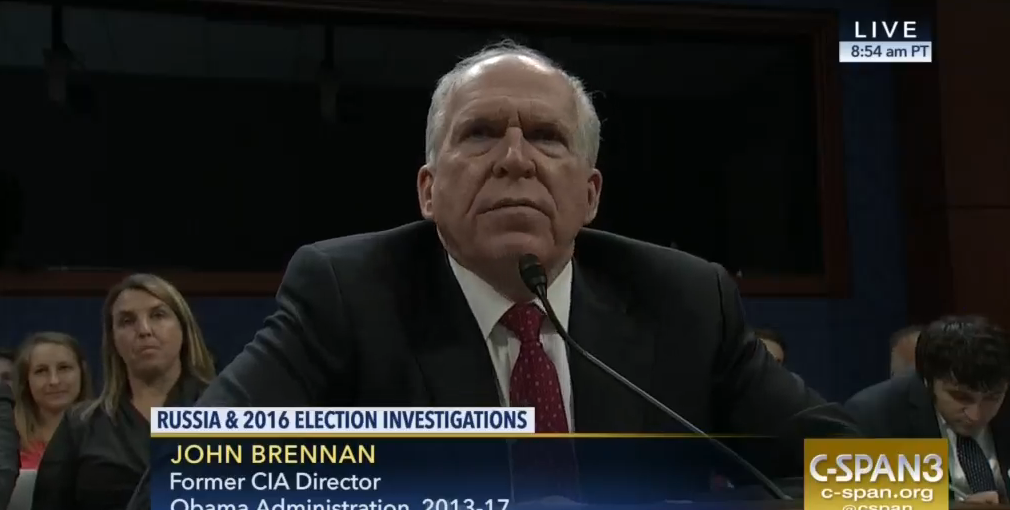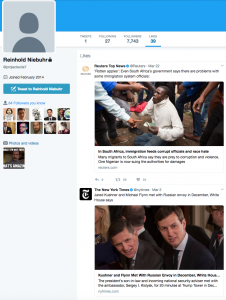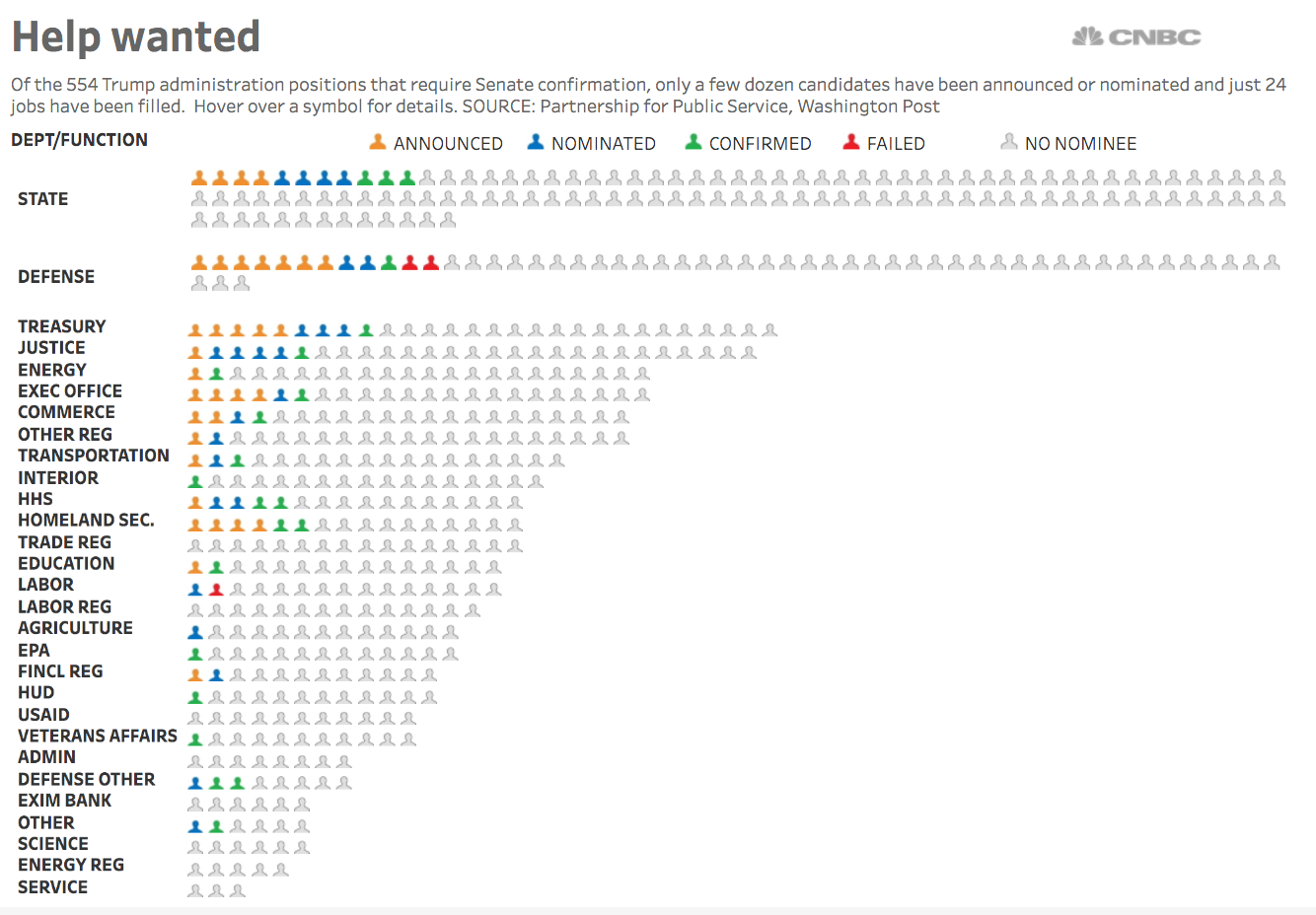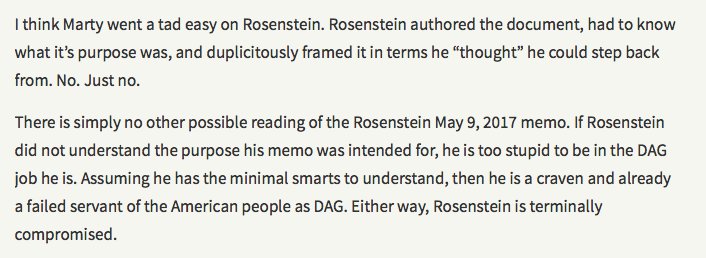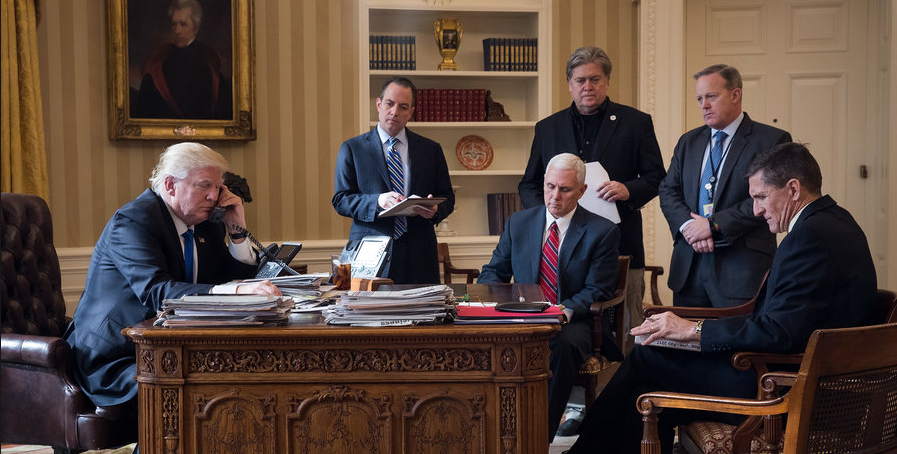Sessions Recusal: Election And/Or Russia?
Back when Jeff Sessions recused from the investigation into Trump, I noted that it was actually fairly narrow. He recused from election-related issues, but said nothing about Russia.
[T]he only thing he is recusing from is “existing or future investigations of any matters related in any way to the campaigns for President of the United States.”
There are two areas of concern regarding Trump’s ties that would not definitively be included in this recusal: Trump’s long-term ties to mobbed up businessmen with ties to Russia (a matter not known to be under investigation but which could raise concerns about compromise of Trump going forward), and discussions about policy that may involve quid pro quos (such as the unproven allegation, made in the Trump dossier, that Carter Page might take 19% in Rosneft in exchange for ending sanctions against Russia), that didn’t involve a pay-off in terms of the hacking. There are further allegations of Trump involvement in the hacking (a weak one against Paul Manafort and a much stronger one against Michael Cohen, both in the dossier), but that’s in no way the only concern raised about Trump’s ties with Russians.
Which is why I was so interested that Jim Comey emphasized something else in his testimony (see this post on this topic) — issues pertaining to Russia. [my emphasis throughout]
We concluded it made little sense to report it to Attorney General Sessions, who we expected would likely recuse himself from involvement in Russia-related investigations. (He did so two weeks later.)
This came up in his hearing yesterday, as well. First Wyden asked why Sessions was involved in Comey’s firing if he got fired for continuing to investigate Mike Flynn’s ties to Russia.
WYDEN: Let me turn to the attorney general. In your statement, you said that you and the FBI leadership team decided not to discuss the president’s actions with Attorney General Sessions, even though he had not recused himself. What was it about the attorney general’s interactions with the Russians or his behavior with regard to the investigation that would have led the entire leadership of the FBI to make this decision?
COMEY: Our judgment, as I recall, is that he was very close to and inevitably going to recuse himself for a variety of reasons. We also were aware of facts that I can’t discuss in an opening setting that would make his continued engagement in a Russia-related investigation problematic. So we were convinced — in fact, I think we’d already heard the career people were recommending that he recuse himself, that he was not going to be in contact with Russia-related matters much longer. That turned out to be the case.
WYDEN: How would you characterize Attorney General Sessions’s adherence to his recusal? In particular, with regard to his involvement in your firing, which the president has acknowledged was because of the Russian investigation.
COMEY: That’s a question I can’t answer. I think it is a reasonable question. If, as the president said, I was fired because of the Russia investigation, why was the attorney general involved in that chain? I don’t know.
Then Kamala Harris asked whether there had been any official guidance on recusal.
HARRIS: Thank you. As a former attorney general, I have a series of questions in connection with your connection with the attorney general while you were FBI director. What is your understanding of the parameters of Attorney General Sessions’ recusal from the Russia investigation?
COMEY: I think it’s described in a written release from DOJ which I don’t remember sitting here but the gist is he will be recused from all matters relating to Russia or the campaign. Or the activities of Russia and the ’16 election or something like that.
HARRIS: So, is your knowledge of the extent of the recusal based on the public statements he’s made?
COMEY: Correct.
HARRIS: Is there any kind of memorandum issued from the attorney general to the FBI outlining the parameters of his recusal?
COMEY: Not that I’m aware of.
In every comment, Comey emphasized the Russian aspect. Indeed, most of his comments only mention Russia; just one instance mentions the election.
Indeed, yesterday’s hearing made it clear that Comey believed Sessions should be recused from Russia-related issues because of unclassified issues that include his undisclosed two (now three) conversations with Russian Ambassador Sergey Kislyak.
After yesterday’s hearing, DOJ issued a statement (reproduced in its entirely below), and also released an email that appears to serve as the written guidance on Sessions’ recusal. Yesterday’s statement makes the limitation to election-related issues even more explicit.
Given Attorney General Sessions’ participation in President Trump’s campaign, it was for that reason, and that reason alone, the Attorney General made the decision on March 2, 2017 to recuse himself from any existing or future investigations of any matters related in any way to the campaigns for President of the United States.
So while the email directive does state Sessions’ recusal “extends to Department responses to Congressional and media inquiries related to any such investigations,” not a single thing from DOJ ever mentions the word Russia.
There are actually many important potential implications of this.
It may mean, for example, that Sessions feels he had every right to help Trump fire Comey for his aggressive investigation in Russian issues — even in spite of the fact that his own actions may be reviewed in the Russian investigation — because the Flynn investigation pertained to issues that happened after the election.
More alarmingly, it may mean that there will be a squabble about the scope of Robert Mueller’s special counsel investigation, which has already started digging into matters of Russian corruption that go back years, because Rod Rosenstein overstepped the scope of his own authority based on the limits of Sessions’ recusal.
Jim Comey thinks that as soon as February 14, it was clear that Sessions had to recuse from Russian related issues. Instead (all the evidence suggests) he recused only from election related issues.
The difference in understanding here is troubling.
Update: A friend notes that Jeff Sessions basically relied on Rod Rosenstein’s letter in recommending Trump fire Comey.
[F]or the reasons expressed by the Deputy Attorney General in the attached memorandum, I have concluded that a fresh start is needed at the leadership of the FBI.
The friend suggested that because Comey’s actions implicated the election, that means Sessions intervened in matter pertaining to the election (albeit for Trump’s opponent).
I’m not so sure. The phrasing of Rosenstein’s letter here is critical. Democrats may be angry at Comey for reopening the investigation (and sending a sure-to-leak letter to a stable of GOP Committee Chairs) days before the election. So to Democrats, Comey’s handing of the Hillary investigation pertains to the election.
But Rosenstein frames the issue in terms of “usurp[ing] the Attorney General’s authority” and “supplant[ing] federal prosecutors and assum[ing] control of the Justice Department.” While Rosenstein cites Eric Holder and Donald Ayer describing how Comey’s actions violated long-standing policies pertaining to comments in advance of elections, the Deputy Attorney General himself pitches it as insubordination.
Update: On Twitter Charlie Savage suggested the scope of the recusal could be taken from the language of Comey’s confirmation of the investigation in a HPSCI hearing on March 20, arguing that on March 2, when Sessions recused, the investigation and its ties to campaign members who spoke to Russians had not yet been disclosed.
I have been authorized by the Department of Justice to confirm that the FBI, as part of our counterintelligence mission, is investigating the Russian government’s efforts to interfere in the 2016 presidential election and that includes investigating the nature of any links between individuals associated with the Trump campaign and the Russian government and whether there was any coordination between the campaign and Russia’s efforts. As with any counterintelligence investigation, this will also include an assessment of whether any crimes were committed.
Except this statement says nothing about Jeff Sessions’ recusal, and in Thursday’s testimony, Comey said he was unaware of a memo aside from Sessions public statement. As noted above, the email that DOJ has now pointed to says nothing about Russia.
Plus, even if the recusal originally intended to include the secret Russia investigation, the statement written on Thursday, very clearly in response to Comey’s testimony and repeated claims that Sessions had to recuse from Russia-related issues, said the only reason Sessions recused was because of the campaign tie. And as I noted in my original post on the scope of Sessions’ recusal, he played games in his admission of conversations with Sergey Kislyak as to whether they pertained to Russia.
Update: In a March 6 letter to SJC claiming he didn’t need to correct his false testimony on conversations with Sergey Kislyak, Sessions said that his recusal should cover Russian contacts with the Trump transition and administration.
The March 3, 2017, letter also asked why I had not recused myself from “Russian contacts with the Trump transition team and administration.” I understand the scope of the recusal as described in the Department’s press release would include any such matters.
This would seem to conflict with Thursday’s statement.
______________________________________________________________________________
FOR IMMEDIATE RELEASE
THURSDAY, JUNE 8, 2017
DEPARTMENT OF JUSTICE ISSUES STATEMENT ON TESTIMONY OF FORMER FBI DIRECTOR JAMES COMEY
WASHINGTON – In response to testimony given today by former FBI Director James Comey, Department of Justice Spokesman Ian Prior issued the following statement:
- Shortly after being sworn in, Attorney General Sessions began consulting with career Department of Justice ethics officials to determine whether he should recuse himself from any existing or future investigations of any matters related in any way to the campaigns for President of the United States.
Those discussions were centered upon 28 CFR 45.2, which provides that a Department of Justice attorney should not participate in investigations that may involve entities or individuals with whom the attorney has a political or personal relationship. That regulation goes on to define “political relationship” as:
“[A] close identification with an elected official, a candidate (whether or not successful) for elective, public office, a political party, or a campaign organization, arising from service as a principal adviser thereto or a principal official thereof ***”
Given Attorney General Sessions’ participation in President Trump’s campaign, it was for that reason, and that reason alone, the Attorney General made the decision on March 2, 2017 to recuse himself from any existing or future investigations of any matters related in any way to the campaigns for President of the United States.
- In his testimony, Mr. Comey stated that he was “not *** aware of” “any kind of memorandum issued from the Attorney General or the Department of Justice to the FBI outlining the parameters of [the Attorney General’s] recusal.” However, on March 2, 2017, the Attorney General’s Chief of Staff sent the attached email specifically informing Mr. Comey and other relevant Department officials of the recusal and its parameters, and advising that each of them instruct their staff “not to brief the Attorney General *** about, or otherwise involve the Attorney General *** in, any such matters described.”
- During his testimony, Mr. Comey confirmed that he did not inform the Attorney General of his concerns about the substance of any one-on-one conversation he had with the President. Mr. Comey said, following a morning threat briefing, that he wanted to ensure he and his FBI staff were following proper communications protocol with the White House. The Attorney General was not silent; he responded to this comment by saying that the FBI and Department of Justice needed to be careful about following appropriate policies regarding contacts with the White House.
- Despite previous inaccurate media reports, Mr. Comey did not say that he ever asked anyone at the Department of Justice for more resources related to this investigation.
- In conclusion, it is important to note that after his initial meeting with career ethics officials regarding recusal (and including the period prior to his formal recusal on March 2, 2017), the Attorney General has not been briefed on or participated in any investigation within the scope of his recusal.
# # #
17-631

